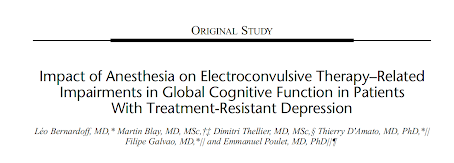Impact of Anesthesia on ECT-Related Impairments in Global Cognitive Function in Patients With Treatment-Resistant Depression: Study From France
Out on PubMed, from investigators in France, in JECT, is this study:
Impact of Anesthesia on Electroconvulsive Therapy-Related Impairments in Global Cognitive Function in Patients With Treatment-Resistant Depression.J ECT. 2025 Feb 17. doi: 10.1097/YCT.0000000000001119. Online ahead of print.
PMID: 39961035
The abstract is copied below:
Introduction: Electroconvulsive therapy (ECT) in patients with treatment-resistant depression frequently leads to impairments in global cognitive function. Propofol and etomidate are the 2 most frequently used drugs for anesthetic induction during ECT. However, only few studies compared their differential impact on ECT-related impairments in global cognitive function.
Methods: We studied retrospectively 75 patients hospitalized at Centre Hospitalier Le Vinatier (Bron, France) who met the DSM-V criteria for major depressive disorder and were treated with bilateral ECT to compare the effects of propofol and etomidate on ECT-related cognitive impairment. Global cognitive function was assessed with the Montreal Cognitive Assessment (MoCA), and symptom severity was assessed using the Montgomery-Åsberg Depression Rating Scale (MADRS), both before and after treatment. The primary endpoint of the study was the change in MoCA score.
Results: We found no significant difference in MoCA score variation between the etomidate and propofol groups. There were also no significant differences in MADRS score variation, responder, remission rate or ECT parameters between the 2 groups (except duration of electroencephalogram crisis).
Conclusions: In this retrospective study, choice of etomidate or propofol as anesthetic agent had no impact on the adverse effects associated with ECT on global cognitive function in patients with treatment-resistant depression.
The paper is here.
And from the text:
This is a small, methodologically simple study showing no difference in global cognitive function after etomidate or propofol anesthesia for ECT. As expected, seizure length with etomidate was a bit longer.
It is worth noting, "Medical records of every patient with TRD who received ECT from May 2015 to May 2022 at the Ugo Cerletti specialized unit of the “Le Vinatier” Hospital Center (Lyon, France) were retrospectively selected."
Kudos to our French colleagues for this helpful contribution to the evidence base for techniques in ECT anesthesia.






Comments
Post a Comment